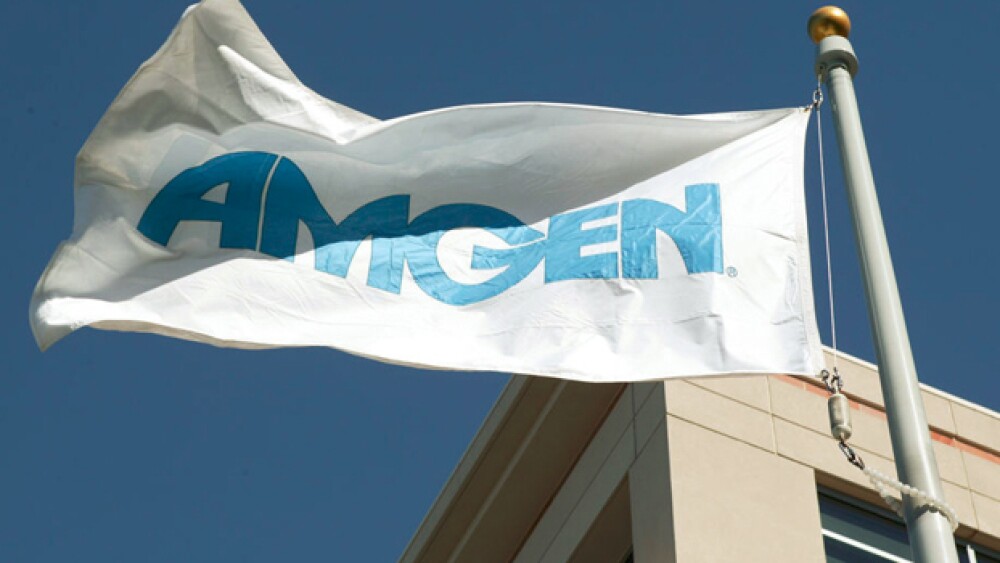Amgen and Allergan announced positive top-line results from a Phase I/Phase III trial of their biosimilar candidate, ABP 798, to Genentech and Biogen’s Rituxan (rituximab).
Amgen and Allergan announced positive top-line results from a Phase I/Phase III trial of their biosimilar candidate, ABP 798, to Genentech and Biogen’s Rituxan (rituximab).
Biosimilars are generic versions of biologic drugs, but unlike traditional generics, they are not direct copycats, but “similar.” As such, they are required to go through an approval process much like that for a traditional branded drug.
Rituxan has been approved to treat non-Hodgkin’s Lymphoma (NHL), chronic lymphocytic leukemia (CLL), rheumatoid arthritis (RA), granulomatosis with polyangiitis (GPA) & microscopic polyangiitis (MPA), and pemphigus vulgaris (PV). Sold under the names Rituxan and MabThera, the drug had 2017 total sales of $9.238 billion. In 2017, it was ranked as the second best-selling drug in the world behind AbbVie’s Humira (adalimumab).
Today’s trial announcement was for ABP 798 in moderate-to-severe rheumatoid arthritis, where it was compared to rituximab. The results of the trial met the primary endpoint of pharmacokinetic (PK) similarity. Equivalent efficacy was established and the biosimilar and reference drug had similar safety profiles.
This trial is the first of two the companies plan to use as the basis for global regulatory submissions. The second trial is being performed in patients with NHL.
“Results from this study show pharmacokinetic and clinical equivalence between ABP 798 and rituximab, further demonstrating Amgen’s commitment to providing patients with access to high-quality, biological therapies,” stated David M. Reese, Amgen’s executive vice president of Research and Development. “We look forward to continuing to leverage our experience and expertise in biotechnology to bring more biosimilars to patients.”
The Phase I/Phase III trial was a randomized, double-blind study that evaluated the PK, efficacy and safety of ABP 798 compared to rituximab in patients with moderate-to-severe rheumatoid arthritis. In the trial, 311 patients were enrolled and randomized one-to-one-to-one to receive ABP 798, rituximab from the U.S., or rituximab from the European Union (EU), and administered intravenously at baseline and again at week 24.
The collaboration between Amgen and Allergan was formed in December 2011, when Allergan was then Watson Pharmaceuticals. The focus was on developing and commercializing four oncology antibody biosimilars.
Amgen currently has 10 biosimilars in its portfolio, two approved in the U.S., and three approved in the EU.
In November 2018, the U.S. Food and Drug Administration (FDA) approved Celltrion and Teva Pharmaceutical’s Truxima (rituximab-abbs), a biosimilar to Rituxan. It was approved for adults with CD20-positive, B-cell NHL either as monotherapy or in combination with chemotherapy.
Like Rituxan, Truxima carries a boxed warning label about the risk of fatal infusion reactions, skin and mouth reactions, hepatitis B reactivation, and a rare but serious brain infection. Truxima was the first biosimilar to rituximab approved by the FDA.
If, or more likely, when Amgen and Allergan’s biosimilar for Rituxan is approved, it will be just another factor eating away at Rituxan sales. In Roche’s 2018 first-half earnings report, it cited a 9 percent decrease in global Rituxan sales, primarily the result of biosimilar competition in Europe. This came to a decrease in revenue of more than $450 million in that six-month period, or a 47 percent decrease year-over-year during the same period.
In an August 24, 2018 article, Pharmaceutical Technology noted, “Roche has tried to pad its bottom line with newer drugs, such as Tecentriq, Ocrevus, and Perjeta. However, the growth in sales of these products is not expected to come close to covering the revenue losses caused by the biosimilar erosion of mega-blockbusters such as Rituxan, Avastin, and Herceptin.”





